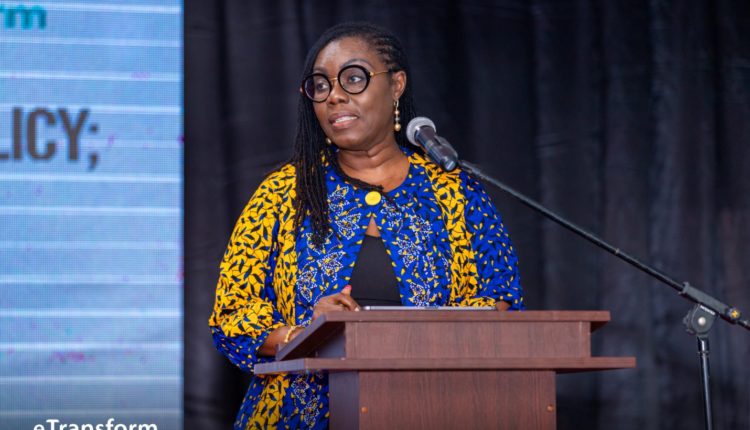The Minister of Communications and Digitalisation, Mrs. Ursula Owusu-Ekuful has led a team of Government officials to begin a National Stakeholder Consultation to review the Ghana Digital Economy Policy with relevant industry people.
The policy seeks to address opportunities and set the direction for the evolving digital economy following developments since the ICT for Accelerated Development (ICT4AD) policy was adopted in 2003.
It identifies key priorities as pillars upon which digital economy capabilities can be built on a national level to enable inclusive economic growth. The policy addresses Digital Infrastructure, Data-driven Innovation and Entrepreneurship, Data Protection, User Privacy, Cybersecurity, Digital literacy, and skills.
The strategy further addresses the capabilities to target sectors where digital technologies are most likely to have significant impact in delivering on national priorities, including sustainable job creation and accelerated economic growth.
Over the last few decades, the policy and infrastructure-related reforms, with telecom services as the main driver, unlocked economic pathways leveraging the mobile phone as a tool for connectivity, information services, and digital financial services.
“These developments have led to the advancement of a local tech entrepreneurial ecosystem, related skills development, digital government platforms and the explosion of data and other emerging technologies, such as Artificial Intelligence, Advanced Data Analytics, IoT, Blockchain metaverse and quantum computing,” Mrs. Ursual Ekuful stated during the stakeholder consultation forum at the Accra Digital Centre on Wednesday, November 16, 2022.
Local innovation critical to GDP growth
Continuing, Mrs. Owusu-Ekuful said this policy seeks to establish an open, secure, hyper-connected and inclusive digital economy that unleashes the innovative genius of digital entrepreneurs across various sectors; creating sustainable jobs for the youth, enabling efficient delivery of government services, and positioning Ghana as a regional digital hub.
In the fifth and final rolling-out phase of the ICT4AD 2003 policy which applies from 2019 – 2022, the focus shifts to “sustaining economic development and growth toward improving national prosperity and global competitiveness”.
“As we look backward at what we have achieved so far in ICT development outcomes and set forth a future path, we are also influenced by lessons learned from the COVID-19 pandemic – reflected in the GhanaCARES programme’s focus on fast-track digitisation to achieve economic transformation,” Mrs. Owusu-Ekuful said.
She said government’s commitment to delivering seamless and efficient digital governance for citizens is reflected in the Ghana Integrated Digital Transformation (GIDT) Blueprint and its recommendation on anchoring digital government transformation on a robust Common National Digital Architecture (CNDA).
“The vision places firm sights on the next stage of digitalisation via harnessing technologies such as big data analytics and artificial intelligence to enhance precision in decision-making, and to deliver targetted outcomes including enhancing domestic revenue mobilisation,” she said.
She added: “Ultimately, this policy’s vision speaks to leadership, focus and empowerment in the evolving digital economy; through building capabilities and capacity in harnessing emerging technologies of the Fourth Industrial Revolution (4IR) to drive national economic transformation”.
5 Policy Pillars
The 5 policy pillars she indicated will prioritize and advance to accelerate the realization of the desired economic and social outcomes.
“We can’t do everything but must focus on key drivers which will enable us attain our policy goals. Through the policy formulation effort, we have identified five policy pillars for your consideration: I’m adding this caveat that you are free to propose others if the discussions lend that conclusion” she made it known.
- Universal Access and Connectivity: emphasizes the continued effort to extend the last mile connectivity for unserved and underserved areas as well as consolidating our existing backbone network infrastructure
- Digital Skills: ensuring that the workforce is empowered to participate in the fast-changing digital economy with an emphasis on capacity, capability and research and development (R&D) to harness novel areas of opportunity
- Digital Entrepreneurship and Innovation: to support the local ecosystem of technology innovators to lead in solutions that address major local challenges across target sectors and towards our ambitions to be a regional digital hub
- Digital Government: to ensure that efficiency, security, trust and responsiveness feature in citizens’ experience of digital service delivery from the government based on standardized enterprise architecture and interoperable systems
- Data and Emerging Technologies: to harness the new and fast-growing national data assets with adequate frameworks to protect and derive value, and provide an enabling regulatory environment for the adoption of new technologies that drive our goals and preserve our values and laws.




Comments are closed.